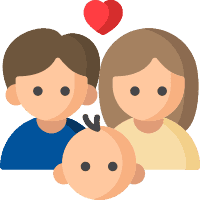Registering your child for Kindergarten can be incredibly exciting. There’s just so much to look forward to! Your child will take their first steps towards learning in a formal environment, discovering new vocabulary words, learning about bigger numbers, experiencing new areas of enrichment and wondrous ideas.
But parents and their children both may also experience feelings of reluctance and anxiety. After all, is your child ready for Kindergarten? There are so many social, emotional, and cognitive skills that kids need before they even set foot in a classroom. So how can you know if your child is ready?
Most specialists recommend looking at academic milestones to evaluate whether your child demonstrates the expectations that he is ready for kindergarten. Using these concrete criteria will help you determine which areas are strong and which areas could use a boost.
Benchmarks for Kindergarten Readiness
Speech-Related Benchmarks
As children enter Kindergarten most experts recommend that your child:
- Demonstrate the ability to listen and follow instructions: A child new to Kindergarten should demonstrate competence in following, at least, 2-step directions. For example, the teacher might request that the child “hang up their coat and sit in the circle”. Of course, this may not be successful on the first day of kindergarten as they are learning where their cubby is to hang up their coat and where the circle is but similar skills demonstrated at home will let you know your child has mastered this task. For example, you might ask your child to get an object from another room and put it in a designated spot in a separate room.
- Can get along with peers: Ideally, before your child enters Kindergarten, they will have experiences interacting with other children. This may include siblings, cousins or peers. Examples of successful pragmatic skills includes taking turns, playing cooperatively or sharing a favorite toy. Also role playing within a group will assist your child in working well with others. Children enjoy playing what they know and experience. Children around ages 5 and 6 like to dole out roles of mommy, daddy and baby during “house play” which they have seen modeled at home to imitate.
- Recognize letters, numbers and shapes: Kindergarteners do not need to be proficient in reading before enrollment. However, school will be less challenging if they enter with the ability to recognize the letters of the alphabet, common shapes as well as identifying numbers up to, at least, 10. In addition, it is a benefit for children to demonstrate beginning reading skills of associating the sounds a letter makes as well as beginning to rhyme words.
- Is able to communicate with adults and peers: Children entering Kindergarten should be able to communicate with both peers and with adults. Teachers will be watching for skills of being able to express a story about what happened in their day with a beginning, middle and end to the story. As well as, grammatically correct sentences with accurate use of grammatical markers, pronouns, superlatives, and adjectives.
Academic-Related Benchmarks
Pre-Kindergarten curriculum will vary from state to state. However, most parents should keep an eye on the following academic benchmarks when it comes to getting your child ready for Kindergarten:
- The ability to write their own name.
- Demonstrated ability to independently count to, at least, 10.
- An expressed curiosity in learning and exploring.
Occupational Benchmarks
Your child’s ability to use and control their body will have an impact on their learning in a formal setting. Experts recommend considering the following benchmarks:
- Impulse control: skills will have developed to allow kids to pay attention and limit disruptive behaviors for an age expected time of 10-15 minutes.
- Sitting still: A fair amount of education still happens when a child is sitting. As a result, your Kindergartner-to-be should be able to sit still and attend for the duration of a story or a short lesson.
- Using the restroom: In general, most schools require that your child be able to use the restroom on their own. Your child should be mostly self-sufficient before they begin Kindergarten.
- The ability to use scissors and glue: Children should demonstrate the fine motor skills necessary to use basic implements, such as pencils, markers, crayons, safety scissors, and glue.
Other Considerations
As you get your child ready for Kindergarten, there are some other behavior benchmarks you may want to stay aware of. In general, parents may want to pay attention to how well their kids express emotions and empathize with other children. It’s also helpful if your child is actively stimulated by learning new things–even if those things are in areas where your child already has an interest.
What Can Parents Do to Help?
Parents can play an especially important role when it comes to getting their kids ready for Kindergarten. Learning and enrichment in the home environment can give Pre-K students the confidence to tackle concepts introduced in Kindergarten. But the help of parents need not be confined to practicing math problems or reciting the alphabet. There are many ways you can help get your kiddo ready for Kindergarten.
Health and Wellness
One of the first and most important steps is ensuring that children stay happy and healthy. Usually, this means keeping up with wellness visits and promoting good health with age-appropriate nutrition and exercise.
Scheduling regular wellness visits will also give your child’s pediatrician the opportunity to examine your Kindergartener-to-be for motor, speech, and emotional development. Charting your kiddo’s progress can help make sure that your child is physically prepared for Kindergarten. And, if deficiencies are found, your pediatrician will be able to recommend therapies and remedies.
Reading Encouragement
In terms of academics, one of the single most influential things parents can do is read aloud to their children. This has demonstrably been shown to significantly increase aptitudes for reading and language development over time. In fact, reading to your children can promote many Kindergarten-readiness skills, including:
- Encouraging the understanding that printed words have a meaning behind them: Children will learn, essentially, that written words have a meaning on par with spoken language.
- The recognition of similar sounds: Rhymes are a common example of how children can pick up on similar sounding words and begin to differentiate vowels and consonants..
- The recognition of numbers, colors, and shapes: These are represented in a wide variety of ways in children’s books. Kindergarten will challenge a child to identify a labeled number, color or shape. Your child should be able to identify a variety of colors and shapes when labeled or label themselves when asked.
- Emotional skills: Kids can learn empathy and social and emotional skills from stories and books. Help your child label how the character is feeling when reading stories.
- Vocabulary skills: Exposing your child to a variety of books will help build their vocabulary and learn how words can be used to express thoughts and ideas.
- Letters and sounds: By trying to read along or becoming familiar with stories, kids can begin to associate certain letters with specific sounds. Also they will learn what story sequence sounds like which will help them tell sequenced stories with a beginning, middle and end.
All of these skills can help Pre-K children get ready for Kindergarten. That’s why parents are so strongly encouraged to read regularly to their children.
Enrichment Learning
Getting your child ready for Kindergarten could also include taking advantage of structured learning possibilities that come along. Enrichment opportunities could include everything from swimming lessons to story time at the library to online class on a topic that energizes the child. These enrichment activities are often community based, giving your soon-to-be-Kindergartener an opportunity to blend academic development with social and emotional learning. Also the opportunity to meet new people or other children that will potentially be in their class.
Examples of community-based enrichment activities could include:
- Organized story times at neighborhood bookstores and libraries
- Trips to zoos or museums.
- Community programs based in local city or county parks.
- Playgroups with local neighborhood kids.
- Formal preschools or Head Start programs.
Seeking out enrichment opportunities within your community can give your kiddo a safe, relaxed way to practice their independence in short increments. This approach can help your child get used to the idea of structured learning slowly–and comfortably.
What Should I Do if My Child is Not Ready for Kindergarten?
Steps to Take if You Think Your Child is Not Ready for Kindergarten
If you’ve been looking at this list, and it starts to feel like your child is not ready for Kindergarten, you have several options you can look at:
- Set up an informational meeting with your child’s school district: Ask about expectations. This will help give you a clear idea of what your kiddo will be asked to do. The teachers can help preparre you tell you about how challenging their kindergartener program is. Knowing these expectations will help you make decisions in terms of how to proceed.
- Hold your child back for a year: Most school districts allow you the option to hold your child back for one year. Given the support and guidance of your local school district you can make a more informed decision if this is right for you and your family. You can use this extra year to help develop the skills and habits that will enable your kiddo to succeed once kindergarten begins.
- Enroll your child in half day Kindergarten: Shorter programs can be easier for some kiddos to handle.
- Find a Kindergarten program that better suits your child: Perhaps the school you are currently looking at feels more academic then you would like for your child or perhaps it is to play based. If you have options, you might want to explore different programs in your area.
If there are developmental challenges that are holding your child back, it makes sense to talk to a specialist. If you’re concerned, contact a speech language pathologist to help get your child ready for Kindergarten!
Kindergarten is Just Around the Corner
To learn more about your child’s journey to Kindergarten, or if you have concerns about ensuring that your child is ready, consider contacting us to schedule an appointment. We offer pediatric speech therapy, pediatric occupational therapy, services to children in the Chicagoland area and the surrounding suburbs.


